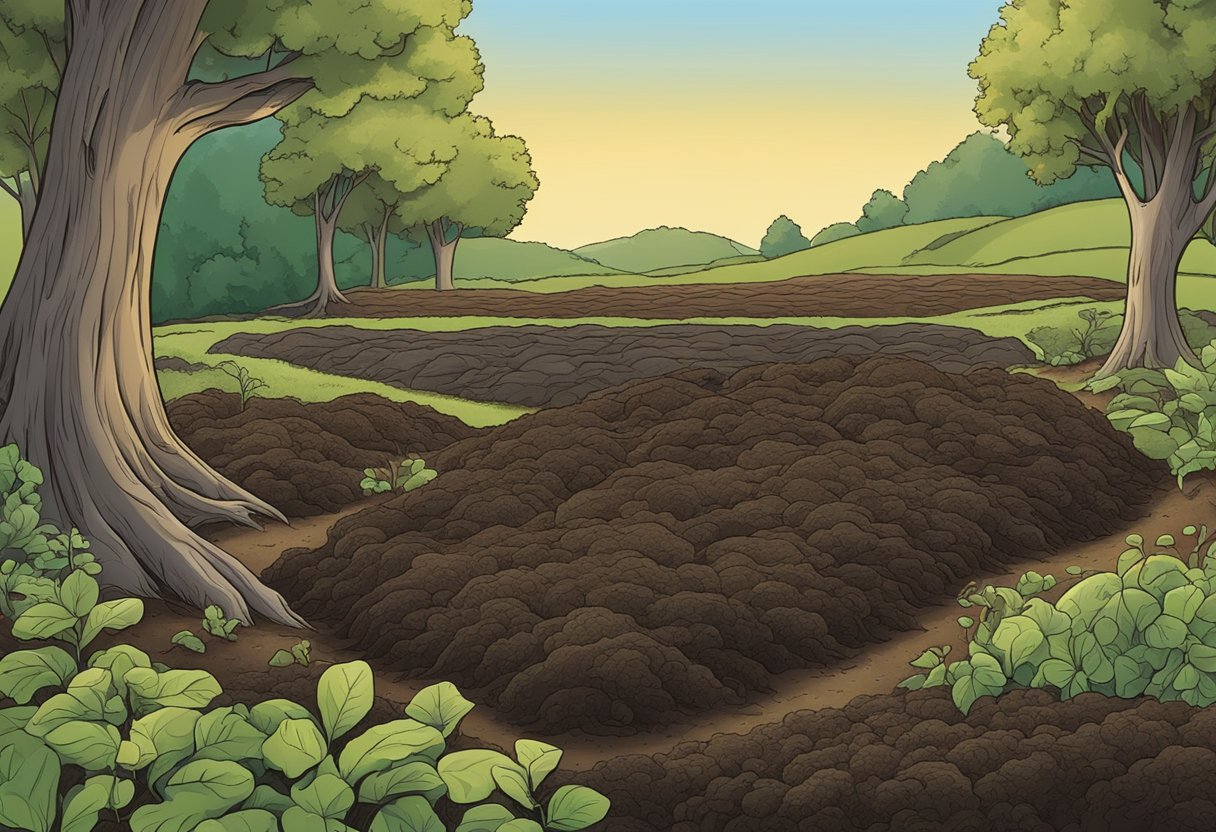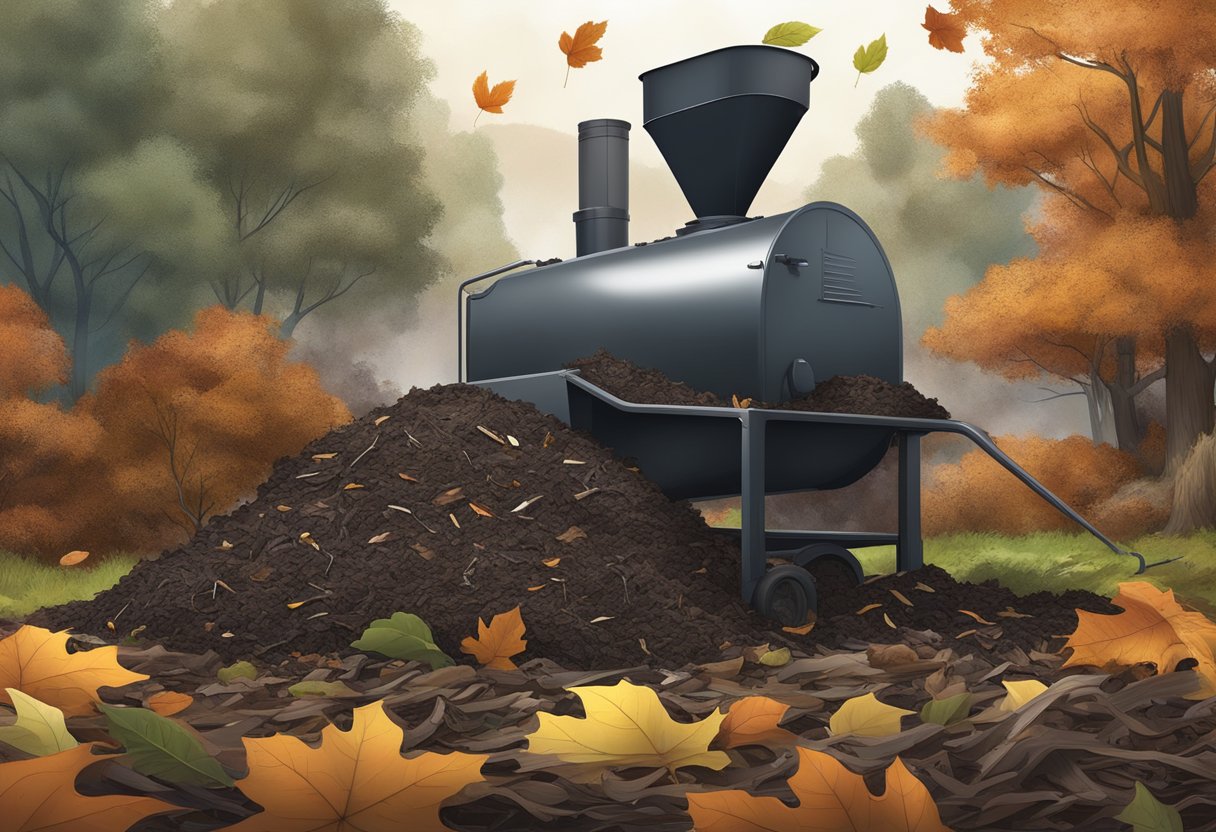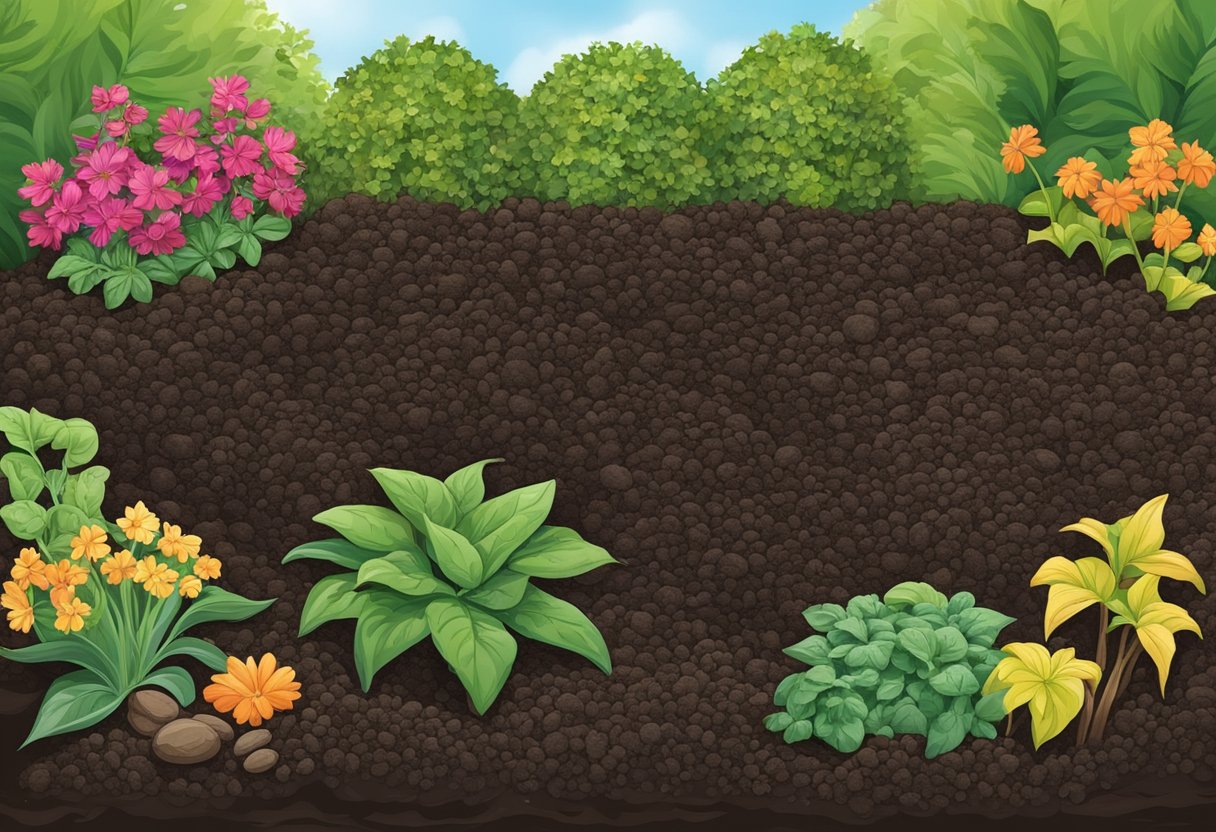Compost mulch is a gardener’s ally, enhancing the soil’s structure, fertility, and microbial life. As decomposed organic matter, compost is rich in nutrients, providing a steady stream of minerals required for plant growth. By applying compost as mulch, we not only feed the soil but also retain moisture, suppress weeds, and regulate soil temperature, creating an optimal environment for our plants.

Our experience has taught us that compost mulch offers a buffer for soil life against extreme conditions. It is a dynamic material that continues to break down, fostering an ecosystem beneath it that benefits the roots it covers. Moreover, the pH of most compost mulch is between 6 and 8, which aligns well with the needs of many garden plants, allowing us to cultivate a healthy garden with less chemical intervention.
The characteristics of compost mulch—such as its water-retention capacity, erosion prevention, and insulation properties—support a sustainable approach to gardening. Using compost mulch, we see a reduction in water usage and an increase in the organic matter of the soil. Our gardening efforts become more efficient and eco-friendly, promoting a cycle of growth and renewal.
Basics of Compost Mulch

In this section, we explore compost mulch, a key component for enriching garden soil and boosting plant health. Compost mulch is decomposed organic matter that can significantly enhance soil properties and support sustainable gardening practices.
Composition and Decomposition
Compost mulch consists of decomposed organic materials like kitchen scraps, grass clippings, shredded leaves, and coffee grounds. During composting, microorganisms break down these materials into a more stable form known as humus. This decomposition relies on a balance of carbon and nitrogen, with elements like pH playing a crucial role in the process.
Benefits for Soil and Plants
By adding compost mulch to soil, we introduce a range of benefits. It enriches soil with nutrients such as nitrogen, phosphorus, and potassium, necessary for plant health. Compost mulch also improves soil structure, enhances its ability to retain moisture, and supports the activity of beneficial microbes and earthworms.
Practical Application in Gardening
For effective mulching, we apply a layer of compost mulch to garden beds, flower beds, and vegetable gardens. It’s beneficial as top dressing in spring or autumn to prepare plant beds for the upcoming season. Mulching also reduces the need for frequent watering and helps suppress weed growth.
Types of Compost Mulch
Compost mulch originates both from organic sources like leaf mold, wood chip, and straw, as well as inorganic materials such as paper, stones, and landscape fabric. Organic mulch tends to provide more nutritional benefits as it decomposes.
Impact on the Environment
Using compost mulch positively impacts the environment by recycling organic matter and reducing waste. It also plays a role in minimizing soil erosion and promotes a healthier, more resilient landscape by fostering a balanced ecosystem.
Mulch Management Techniques
To manage mulch effectively, we ensure an appropriate depth, typically 2-3 inches, and avoid piling it against plant stems to prevent rot. Aeration may be necessary to prevent the compost mulch from compacting and obstructing water infiltration. By maintaining the right balance and refreshing mulch as needed, we protect soil moisture and safeguard against soil erosion and drying out.
Advantages of Using Compost as Mulch

Using compost as mulch brings multifaceted benefits to a garden. We’ll explore how it helps conserve moisture, suppresses weed growth, and enriches the soil through a slow release of nutrients, among other advantages.
Moisture Conservation and Weeds Suppression
Compost mulch is highly effective at retaining soil moisture, which helps plants stay hydrated during dry periods. Its application creates a barrier that minimizes evaporation. Additionally, compost mulch effectively suppresses weeds by blocking light and hindering weed seed germination.
Nutritional Contributions and Disease Resistance
Compost introduces essential nutrients into the soil, including nitrogen and carbon, that are vital for plant health. Its breakdown releases these nutrients slowly, providing a stable source of food for plants. This input of organic materials also helps to build disease resistance by fostering beneficial microbial activity.
Seasonal Considerations and Long-Term Benefits
In cold seasons, compost mulch can protect plant roots by keeping the soil temperature more consistent. Over time, the breakdown of organic mulch enhances the topsoil structure and adds to its nutrient richness, making it prime for a thriving garden.
Mulch and Composting Methodologies
There are various composting methods, from traditional pile composting to vermicompost with worms. By understanding these methodologies, we can create more nutrient-rich compost for mulching, which improves the health and sustainability of our landscapes.
Differentiating Mulches and Understanding Usage
It’s important to differentiate between organic mulch like compost, leaf mould, and wood chips, and inorganic mulch such as plastic, stones or landscape fabric. Organic mulches, including compost, not only suppress weeds but also contribute to soil health, unlike inorganic options.
Ensuring a Healthy Ecosystem
Compost as mulch sustains a healthy ecosystem in the garden. It attracts earthworms and beneficial microbes, fostering a living soil and promoting a balance that naturally mitigates pest and disease pressures.
Convenient Practices for Home Gardeners
For home gardeners, using homemade compost as mulch is a convenient and cost-effective practice. It simplifies garden maintenance by improving moisture retention, reducing weed growth, and providing a steady nutrient supply to plants.
Comparison with Inorganic Alternatives
When compared with inorganic alternatives like plastic sheeting or pebbles, compost as mulch proves superior for its role in improving soil fertility and supporting a sustainable garden environment. These natural benefits are not present with inorganic mulches, which can impede soil life and contribute to a less dynamic garden ecosystem.